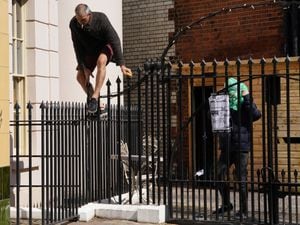Use of stop and search higher in Scotland despite new code of practice
Labour also raised concerns about why use of the procedure has increased in some parts of Scotland, such as the east.

Scotland’s police officers continued to use stop-and-search powers at a higher rate than their counterparts in England, despite the introduction of a new code.
In the first six months after the new code of practice for stop and search came in north of the border, official figures showed 17,446 encounters with police involved a search being carried out.
The total – which covers June to November 2017 – is down from 24,210 in the corresponding period in 2016, a drop of 28%.
However, Labour said its analysis showed there were 5.4 searches for every 10,000 people carried out each month in Scotland compared to a rate of 4.3 per 10,000 people in England and Wales.
Police forces south of the border carried out an average of 25,320.4 stop and searches a month, compared to a monthly average of 2,907.7 in Scotland, the party said.
Scotland introduced a new code of practice for stop and search in May 2017 after concerns were raised about the number of people being searched without a legal basis.
The code sets out that statutory searches must be “necessary, proportionate and in accordance with the law”, and includes specific guidance on dealing with children and vulnerable adults.
A report on the introduction of the code of practice said there had been a “ongoing steady decline” in the use of stop and search since March 2015, when Her Majesty’s Inspectorate of Constabulary in Scotland published a critical report.
After the code of practice was brought in, the number of police searches and seizures in the west of Scotland command area fell by almost 50% compared to June to November 2016, going from a total of 17,204 to 8,862.
However, use of the procedure increased in other command areas, rising from 2,648 in the east of Scotland to 3,806, and going from 4,358 in the North of Scotland to 4,778.
Labour justice spokesman Daniel Johnson said: “It is important with stop and searches that the police strike the right balance between protecting the public and recognising the significant intrusion into personal liberty and privacy.
“Against the background of a new code of conduct on searches by the police, I believe there are questions that need to be answered by the police on their use of this tactic.”
He continued: “Scotland has a worrying history of using stop and searches at a much higher rate than the rest of the UK, and even with the new code of practice the rate has remained higher.
“In that context, I hope that police in the east of Scotland look closely at these figures and examine the reasons why use of stop and search has increased in the region since the new code of practice was introduced.
“Further explanation is also needed to why areas of the country including Edinburgh are seeing large increases, while others, like Glasgow, are seeing sharp decreases.”
Police Scotland Assistant Chief Constable Mark Williams said: “These claims are overly simplistic. The reality is that the volume of stop and searches in Scotland has fallen dramatically and a recent independent review highlighted our continued strong progress.
“Stop and search is still a very valuable policing tactic which contributes to the prevention, investigation and detection of crime, as well as keeping people safe, and we will continue to use it within the strict parameters set in the new code of practice.”
A Scottish Government spokeswoman said: “The operation of the code is a matter for Police Scotland but it has been designed to ensure searches will be carried out with fairness, integrity and respect.
“A recent six month evaluation of the new stop and search code of practice noted an increase in more targeted, effective searches and a fuller 12 month evaluation of the operation of the code is planned.”





